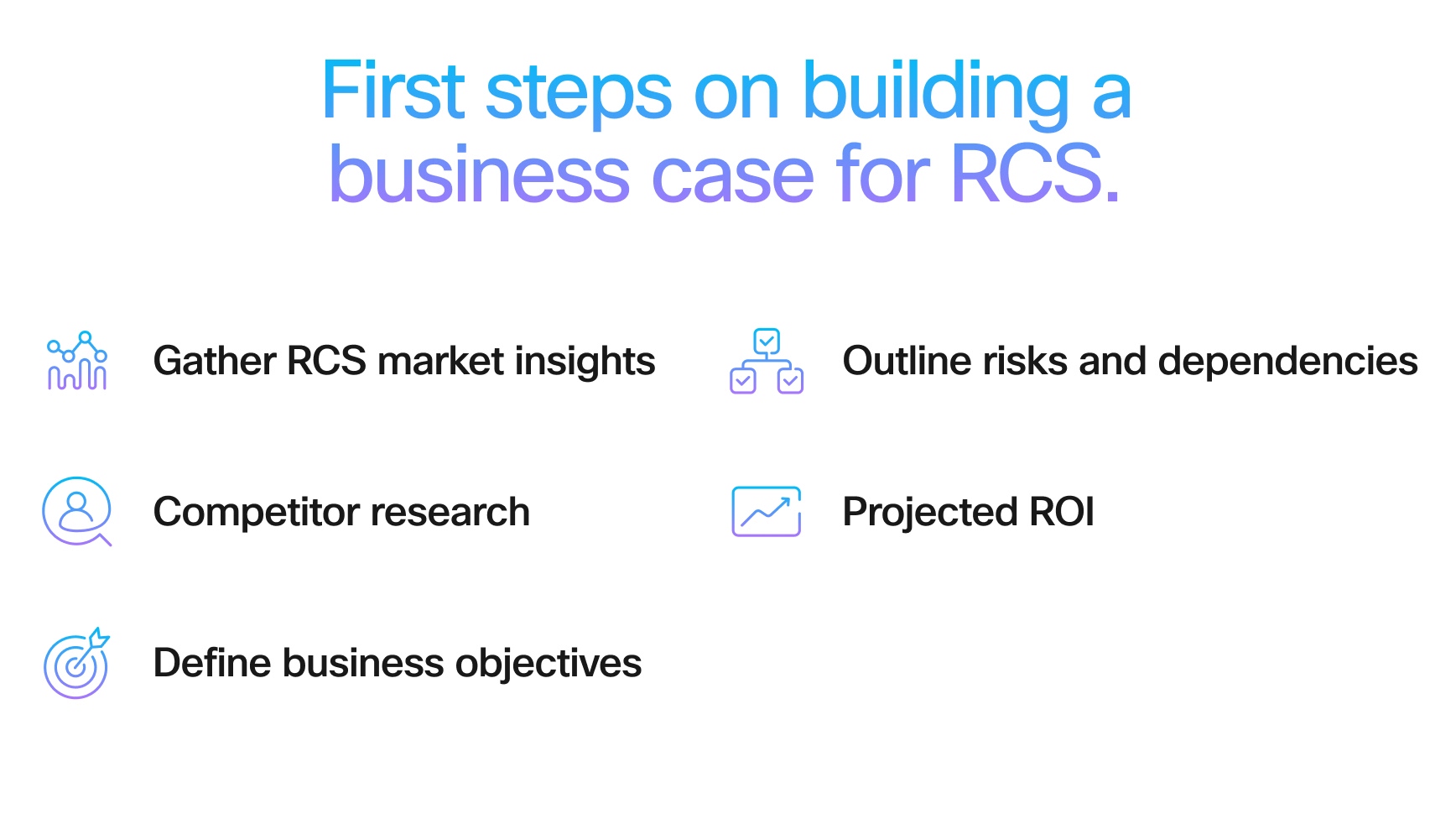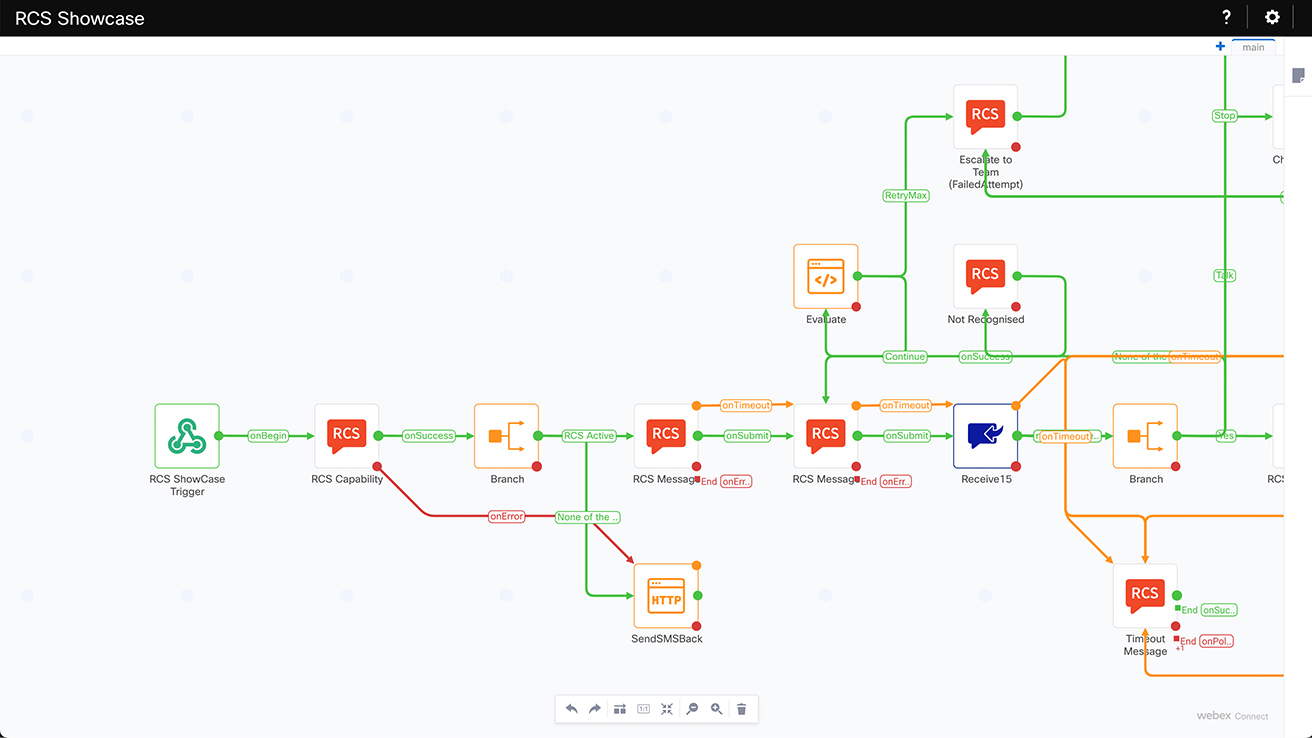Which type of RCS provider is right for your business?
This guide will teach you how to approach choosing an RCS service provider to complement your business strategy.
Contents
SMS remains the easiest way to reach the widest possible audience to mobile phones with simple, direct messaging—but it may not stay that way for much longer.
Rich Communication Services (RCS) offers a more dynamic, interactive experience than SMS and MMS - with more than 1 billion Android users. It’s also now available to Apple devices as part of the iOS 18 update, introducing a further 1.5 billion users to RCS with seamless, cross-platform messaging.
RCS doesn't require users to download a third-party app, unlike comparable messaging tools, such as WhatsApp and Facebook Messenger. And just like SMS using the native messaging app, RCS is now supported by iPhones and many Android phones right out of the box.
RCS business messaging users has increased by 36% from June 2024 compared to the last 12 months.
RCS is great for talking with friends and family, but it truly comes into its own as a business messaging tool. In fact, our independent research found that, when compared to SMS, RCS can improve customer engagement threefold, drive up conversion rates by 50%, and uplift retention by 60%. Plus, 90% of customers feel more assured when they receive an RCS message compared to an SMS text.
In light of Apple devices supporting RCS, we've created a simple guide to help you understand the different types of RCS providers available, and how to identify the right approach to complement your business strategy.
What is an RCS message?
RCS is a messaging protocol used on Android and Apple devices, with the ability to send messages supporting high-resolution images, videos, group chats, carousels, rich cards, and suggested replies.
RCS Business Messaging (RBM) - which is as it sounds - is RCS for business communications. Businesses can send timely, personalized messages using a more secure application-to-person (A2P) protocol. It also lets you add official branded components to every text—including a verified sender ID—so customers can easily recognize your messages as authentic.
RCS features
Here’s some of the headline features that make RCS messages stand out from the crowd:
Interactive action buttons and suggested replies
Real-time typing indicators and read receipts
Image carousels, media cards, and high-res videos
Custom branding and verified business checkmarks
Cross-channel integrations and end-to-end encryption

RCS examples
When you combine these RCS features with a 360-degree customer view, you can build and automate remarkable sales, service, and marketing interactions that drive engagement and loyalty. Some RCS examples you can use to:
Share personalized offers that can be instantly redeemed—or stored for later in the user's digital wallet—just by pressing a suggested action.
Proactively update and notify customers, where they can respond using natural language or pre-populated buttons, such as to confirm they can attend an appointment.
Integrate third-party services and use rich media content, so customers can view goods and services without leaving the RCS chat.
Give 24/7 support with intuitive, AI-powered chatbots that can field basic queries and self-service requests—like asking to return a product.
Counter phishing attempts and build trust in your communications with verified branding, including logos, banners, and contact details.
For more on how RCS enables customer engagement, start reading these guides:
Types of RCS providers
There are generally two types of RCS messaging providers that you can choose from depending on your business needs—let's unpack them.
RCS providers offering APIs
The first RCS provider approach is ideal for organizations with developers who want total control over RCS integration, including the freedom to create bespoke messaging solutions. In this scenario, you'll want to use flexible RCS APIs that interface with your existing systems, apps, and websites.
However, these RCS service providers can slow your sales, service, and marketing teams from experimenting with RCS and adding it to the connected customer journey. Instead, all coding must go through your developers, which can prove costly and time-consuming, delaying time to market—especially if you need to add RCS to complex, omnichannel campaigns.
RCS providers with a single platform
If you want to get started building and managing complex customer journeys across multiple channels—including RCS—as quickly and simply as possible, then a Communications Platform as a Service (CPaaS) is the right choice for you.
CPaaS is a single, connected platform that lets you orchestrate and automate joined-up customer journeys using drag-and-drop components and pre-built integrations that work out of the box. It also provides granular insights into customer engagement trends and campaign performance to help you optimize and adapt your messaging strategy.
This means employees with limited technical experience can build intricate, hyper-personalized interactions that move seamlessly across the latest digital channels—including RCS—democratizing development and accelerating deployment.
The best CPaaS platforms free developers to focus on big-ticket items, rather than field routine coding requests from customer-facing teams. However, should they need to get more deeply involved, they can always use the RCS APIs we mentioned alongside pre-built CPaaS integrations for added flexibility. Quite simply, it offers the best of both worlds.
How to identify the ideal RCS provider
If you're still unsure which approach is right for your organization, that's okay. In fact, it's smarter to identify exactly what you need from RCS before committing to a solution.
To help you choose, consider the following:
1. Do you want to add RCS to your customer communications quickly?
2. Does user accessibility matter more than manual development control?
3. Do you need access to out of the box integrations?
4. Can you access a resilient Tier 1 network with direct global connectivity?
Steps to get started with RCS
Before you commit to an RCS provider, it’s important to build a business case that unites everyone around its shared business value, and earns transparent support from the C-suite. To help get you started, we recommend following these steps:
Compile RCS market insights to showcase its user engagement metrics and how it enhances the customer experience
Investigate how your competitors are using RCS, if at all, and the advantages it is helping them achieve
Define your business messaging objectives and how RCS can help you achieve them more effectively—this should also cover potential risks and dependencies, integration costs, and projected ROI
After which do your research on current RCS messaging providers, a good place to start would be the GSMA where they have a list of all the latest competitors.

Introducing Webex CPaaS with 6+ years of RCS expertize
Whether you want total development control or pre-configured integrations, we've got you covered. With Webex Connect, our enterprise-grade CPaaS platform you can:
Segment RCS audiences: Organize prospects and customers in a single, connected dashboard to personalize campaign messaging for groups and individuals more easily.
Democratize RCS messaging: Automate and schedule RCS messages in a visual journey builder, so everyone can easily contribute to the customer experience.
Easily customize RCS messages: Create compelling customer journeys using customizable action buttons, multimedia content, and contextual triggers in RCS from a single, futureproof platform.
Stay compliant: Ensure compliance with regional and industry regulations such as GDPR, HIPAA and CCPAA, and ISO 270001. And resilient connectivity with a global Tier 1 network.

We’re a proven communications partner to some of the world’s smartest organizations, providing scalable support as their needs shift and evolve. For example, we helped oneSource, a UK-based financial services firm, to replace its traditional mail-based communications, automate timely interactions—such as payment reminders—and build trust and combat fraud through verified branding with RCS. The result? Text read rates increased from 59% to 92% and customer payment rates improved by 30%.
We're constantly iterating our platform and our cloud connectivity which means you'll get the latest and most secure features as soon as they're available. That includes our Tier 1 messaging network, which ensures your RCS texts always take the fastest and most secure route to your local and global customers.
Learn more about RCS and our business messaging solutions by speaking to one of our experts.